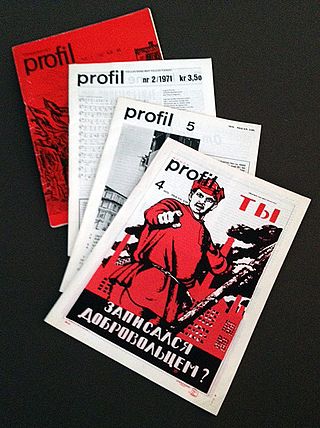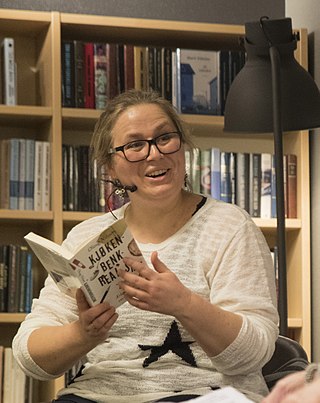Norwegian literature is literature composed in Norway or by Norwegian people. The history of Norwegian literature starts with the pagan Eddaic poems and skaldic verse of the 9th and 10th centuries with poets such as Bragi Boddason and Eyvindr Skáldaspillir. The arrival of Christianity around the year 1000 brought Norway into contact with European medieval learning, hagiography and history writing. Merged with native oral tradition and Icelandic influence, this was to flower into an active period of literature production in the late 12th and early 13th centuries. Major works of that period include Historia Norwegie, Thidreks saga and Konungs skuggsjá.

Jon Olav Fosse is a Norwegian author, translator, and playwright. In 2023, he was awarded the Nobel Prize in Literature "for his innovative plays and prose which give voice to the unsayable."

Lars Saabye Christensen is a Norwegian/Danish author.
Gymnaslærer Pedersens beretning om den store politiske vekkelse som har hjemsøkt vårt land is a novel by Dag Solstad published in 1982. The title translates as Gymnasium Teacher Pedersen's Account of the Great Political Awakening Which Has Haunted Our Country.

Kjartan Fløgstad is a Norwegian author. Fløgstad was born in the industrial city of Sauda in Ryfylke, Rogaland. He studied literature and linguistics at the University of Bergen. Subsequently, he worked for a period as an industrial worker and as a sailor before he debuted as a poet with his collection of poems titled Valfart (Pilgrimage) in 1968. He received the Nordic Council's Literature Prize for his 1977 novel Dalen Portland. Other major works include Fyr og flamme, Kron og mynt, Grand Manila and Grense Jakobselv.
Grex Vocalis is a Norwegian chamber choir, formed in 1971 by Carl Høgset. The repertoire spans from the renaissance to music by contemporary composers. The choir has been awarded the Norwegian Spellemannprisen prize for three of its thirteen albums and has won first prizes in national and international contests. In 1999 Grex Vocalis was awarded Il Gran Premio Città di Arezzo as the overall best choir in that year's contest. Grex Vocalis is primarily an a cappella choir, comprising ca. 35 singers, but performs on occasion also with soloists and orchestras. They have toured extensively in Europe, and also given a series of concerts in Japan and Cuba.

Gro Dahle is a Norwegian poet and writer.

Carl Frode Tiller is a Norwegian author, historian and musician. His works are in Nynorsk, one of the two official Norwegian standard languages.

The Brage Prize is a Norwegian literature prize that is awarded annually by the Norwegian Book Prize foundation. The prize recognizes recently published Norwegian literature.
Mads Wiel Nygaard's Endowment is an annually awarded literary prize from the publishing house Aschehoug. The prize is a recognition of superior literary work. The publisher's editorial management makes the award based on their collective judgement of merit. Applications are not accepted.

Eldrid Lunden is a Norwegian poet, and 1996 became Norway's first professor in creative writing, at Telemark University College. She was awarded the Dobloug Prize in 1989, and the Brage Prize honorary award in 2000.
Lars Amund Vaage was born in 1952 at Sunde, Kvinnherad on the west coast of Norway, and studied classical piano at the Bergen Music Conservatory. He made his literary debut in 1979 with the novel Exercise Cold Winter, and has since published award-winning novels, short stories and collections of poetry, and a long essay on the art of storytelling, Sorrow and Song, 2016. In 1995 he had a definitive breakthrough in Norway with the Critics’ Prize-winning novel Rubato. In 2012, his acclaimed novel Sing, based on his experience of being the parent of a severely autistic child, was a national bestseller, winning the national Brage Prize and nominated for the Critics’ Prize. It has since become a classic.

Einar Økland is a Norwegian poet, playwright, essayist and children's writer.
Mikkjel Fønhus was a Norwegian journalist, novelist and short story writer. Fønhus' stories are often set in the wilderness, featuring animals and animal behaviour.

Profil was a Norwegian literary magazine which had great influence in the late 1960s and the 1970s. The magazine was founded in 1938 as Filologen, a house organ for the Faculty of Humanities at the University of Oslo. Its name was changed to Profil in 1959. In 1966 the magazine was taken over by a group of radical students. They opposed established literary views, and introduced the modernist literature. The circle of writers that emerged are often referred to as the "Profil Generation".
The Riksmål Society Literature Prize is awarded annually by the Riksmålsforbundet for the outstanding publication in riksmål. The prize was awarded until 2002 by the Oslo and Bærum Riksmål League, when it was taken over by the Riksmålsforbundet.

Erling Kittelsen is a Norwegian poet, novelist, children's writer, playwright and translator. He made his literary debut in 1970 with the poetry collection Ville fugler. Kittelsen was part of the poetic action group "Stuntpoetene" during the 1980s, along with Jón Sveinbjørn Jónsson, Triztán Vindtorn, Arne Ruste, Thorvald Steen, Karin Moe, Torgeir Rebolledo Pedersen and others.
Erling Pedersen is a Norwegian novelist, writer of short stories, and children's writer.

Olaug Nilssen is a Norwegian novelist, playwright, children's writer, essayist and magazine editor.

Comrade Pedersen is a 2006 Norwegian drama film directed by Hans Petter Moland, starring Kristoffer Joner and Ane Dahl Torp. It is set in the late 1960s and 1970s and tells the story of a high-school teacher who tries to settle down in a small industrial town and gets caught up in the then trending Marxist-Leninist movement in Norway. The film is an adaptation of Dag Solstad's 1982 novel Gymnaslærer Pedersens beretning om den store politiske vekkelse som har hjemsøkt vårt land.













